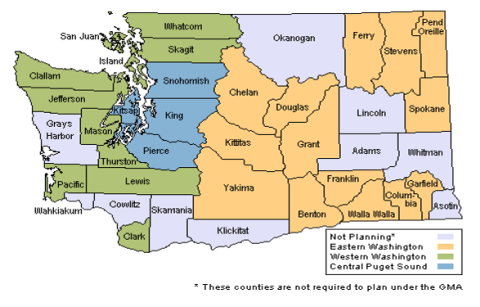Created in 1990, the Growth Management Hearings Board (GMHB) helps residents, local governments, and Washington State manage growth and protect shorelines by providing a pathway for appeals arising under the Growth Management Act and the development of shoreline master programs.
The board hears and decides claims that a city, county, or state agency has not complied with the goals and requirements of the Growth Management Act, some provisions of the Shoreline Management Act, and the State Environmental Policy Act. These disputes arise from challenges to official actions taken by a city, county, or state agency adopting or amending comprehensive plans or development regulations.
The board only reviews local legislative actions when a Petition for Review is filed. The board only can hear cases over which it has subject matter jurisdiction. These include challenges to the following:
- Adoption or amendment of a comprehensive plan
- Designation, adoption, or amendment of regulations concerning resource lands and critical areas
- Adoption or amendment of county-wide planning policies (not subject to a citizen-filed appeal)
- Designation or amendment of Urban Growth Areas
- Adoption or amendment of development regulations that implement the comprehensive plan (zoning, subdivision, etc.)
- Growth management planning population projections prepared by the Washington State Office of Financial Management
- Adoption, amendment, or denial of a Shoreline Master Program
- State Environmental Policy Act documents that accompany a Growth Management Act or Shoreline Master Program action
- Failure of the local government to act to meet a Growth Management Act or Shoreline Management Act statutory deadline
The board DOES NOT have authority to hear cases that challenge compliance with the following:
- Federal or state constitutional issues
- Statutes other than Revised Codes of Washington 36.70A, 90.58, and 43.21C*
- Settlement agreements
- Annexations
- Ballot measures
- Local project review, Revised Code of Washington 36.70B
*Other Statutes: Some parts of comprehensive plans or development regulations are developed under statutes other than the Growth Management Act, for example water and sewer plans, stormwater regulations, and flood management plans. The board has jurisdiction to determine whether such elements comply with the Growth Management Act but cannot determine compliance with the enabling statute.
What is the Growth Management Act?
The Growth Management Act was passed by the Washington State Legislature in 1990 to require comprehensive land-use planning by cities and counties. The law requires counties of a certain size and growth rate, and the cities within them, to engage their residents in a process that ends with the adoption of comprehensive plans and development regulations, guided by the following fourteen goals:

- Focus urban growth in urban areas
- Reduce sprawl
- Provide efficient transportation
- Encourage affordable housing
- Encourage sustainable economic development
- Protect property rights
- Process permits in a timely and fair manner
- Maintain and enhance natural resource-based industries
- Retain open space and habitat areas and develop recreation opportunities
- Protect the environment
- Encourage citizen participation and regional coordination
- Ensure adequate public facilities and services
- Preserve important historic resources
- Goals and policies of the Shoreline Management Act
GMHB Handbook is an informal guide intended to assist individuals and organizations in bringing cases before Washington’s Growth Management Hearings Board.
Case Management System
File and track cases in the online Case Management System. This online database is free and provides information on all the cases active today as well as information about previous cases.
Rulemaking
To see recent and historical decisions made by the board, visit the Case Management System. The board currently does not have any procedural rule changes underway.
Confidentiality
All filings are public record and may be disclosed by ELUHO in response to a public records request. To keep certain confidential documents from being disclosed, assert that the filing falls within one of the statutory exemptions of the Public Records Act.
Include a cover sheet with clear, prominent markings indicating the basis for the exemption and ELUHO will notify the party asserting confidentiality if the documents are public records. Marking the content does not obligate ELUHO to redact, withhold, or otherwise exempt the documents from public disclosure. ELUHO’s notification allows the party to seek a court order barring disclosure pursuant to court protection of public records.
Disclaimer
This website discusses some of the most common rules and issues faced during an appeal before the board. While the information provided here may be used to help prepare a case for a hearing, it is not legal advice. A person or organization is not required to be a lawyer or represented by one. A pro se petitioner is a party representing itself or a citizen group before the board. All people who appear before the board, pro se participants and lawyers alike, must conduct themselves professionally in board proceedings and follow the board rules. A citizen group may appoint one spokesperson to represent the group at the board proceedings. Please review the board rules and other resources on this website for additional information.
Board staff may answer some questions about procedural rules but cannot act as a person’s lawyer or give legal advice. For questions about what decisions should be made or what strategies should be followed, or for help filling out forms or creating legal documents, contact a lawyer. Proceedings before the board are formal and quasi-judicial in nature—in other words, they are a lot like a regular court trial in front of a judge.
